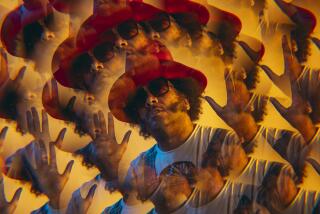Cultural Exchange: Bassem Youssef is a kind of Egyptian Jon Stewart
Reporting from Cairo — — Bassem Youssef is barefoot, pacing around the dining room of his apartment in the tony Maadi neighborhood where he has assembled a crack team of twentysomething bloggers and activists. They are hunched over their laptops in Conan O’Brien and “Family Guy” T-shirts, plotting Egypt’s comedy revolution.
To Youssef, 37, the actual revolution was hilarious.
Much of the January uprising that unseated Egypt’s longtime president was fueled by online media: social networking websites such as Facebook and Twitter, but also clips posted on YouTube — images of Tahrir Square, of protesters and security forces and former President Hosni Mubarak addressing the nation on state television.
He used the clips to create a mock Arabic newscast posted on YouTube, an homage to Comedy Central’s “The Daily Show.” It turned Bassem into an Internet sensation with more than 4 million uploads on YouTube and 88,000 likes on Facebook fans, many of whom greet him on the street by name. Last month, he signed on for a year to produce a television show for Egypt’s ONTV after being courted by the much larger Arabiyah and Al Jazeera satellite networks (he wanted to stick with an Egyptian channel).
He considered taking a break from YouTube while scripting the new show, but the thought made him nervous. So he assembled his team of amateurs — or, as he calls them, “slaves” — to write four final YouTube episodes.
They began their meeting the other day by screening the latest online news videos of clerics discussing sectarian violence, which had dominated the post-revolution news. A blogger suggested Bassem dress up as Muslim and Christian news correspondents. Bassem nixed the idea. He does not like costume changes. He likes subtlety, word play, distorting his rubbery face to suit a host of characters.
They could have a split screen, he suggested instead. He could play the dual roles of Christian and Muslim correspondents simultaneously, both insisting there has been no violence, no sectarian hatred, even as they grow increasingly angry at each other.
Suddenly, Bassem transformed into an enraged correspondent, brandishing an invisible knife. “Nothing’s going on — we’re living in peace!” he snarled as the writers laughed and took notes.
It’s easy to forget this is Bassem’s second career, a startling departure for a man who trained as a heart surgeon and still teaches surgery at Cairo University. He never thought of producing a comedy show until he went to visit protesters in Tahrir Square in January. He ended up treating some of those injured in clashes with security forces and got caught up in the spirit of the movement.
He went home, contacted a video production team and set up a studio in the apartment he shares with his wife. He paid $100 for a plastic backdrop, a collage of revolutionary images: protesters with painted faces hoisting Egyptian flags and confronting troops.
By March 8, he had posted the first of eight videos. Production cost: $5,000.
Bassem styles himself as a sort of Jon Stewart — clean-cut and affable, with the same bright blue eyes, wide with incredulity. But he’s really more Stephen Colbert, always playing the part of the conservative, raising an eyebrow and making deadpan pronouncements straight into the camera. He calls it “the Jon Stewart school” of comedy.
“It’s not just like ‘Saturday Night Live’ where you create sketches,” he says, “You bring reality into it.”
In his first few shows, Bassem satirized the protests and news coverage, which often featured celebrities making wild claims about protesters having group sex and doing drugs in the square. He showed a clip of an Egyptian actress suggesting authorities burn protesters out of the square, then appeared on-screen holding a lighter, one eyebrow raised as if to say “Why not?”
He went to Tahrir Square to interview protesters after Mubarak’s ouster and pretended to be a fan of the former president. “You know, Mubarak is really depressed. He’s having a hard time in Sharm el-Shaikh,” Bassem said, referring to the resort town where Mubarak was hospitalized.
When members of the crowd disagreed, playing along, he turned to the camera and concluded, “People here are easily manipulated.”
“No I’m not,” one woman insisted, smiling.
“Yes,” Bassem shot back, borrowing the language of the counterrevolution. “That’s because you’re a traitor.”
Bassem’s show is, at its core, political. His goal is not just to dissect new media and poke fun at Egypt’s longtime media icons but to get people thinking critically about the news instead of blithely absorbing it, particularly now that the revolution is winding down. “I want people not to be spoon-fed,” he said.
Bassem is Muslim but secular, he said, ever conscious that as a member of the majority the onus is on him to be tolerant. He does not shy away from sectarian humor post-revolution — in fact, he embraces it. While concerns have grown about journalists and bloggers being censored and intimidated by the transitional military government, he thinks dissent breeds tolerance; that Egypt needs to get used to the sound of satire.
At their meeting, his writing team debated whether juxtaposing video of a cleric saying, “Tomorrow belongs to our children,” with footage of a girl at a recent protest chanting, “We have weapons and we can kill people too!” was too provocative. Probably not, Bassem said. Then there’s the video of an Egyptian general warning that everyone wants a piece of the political cake after the revolution, but it’s not baked yet and if they eat it, it will give them diarrhea.
Even after the revolution, Bassem said, Egypt is still pretty hilarious.
Hassan is a news assistant in The Times’ Cairo bureau.
More to Read
The biggest entertainment stories
Get our big stories about Hollywood, film, television, music, arts, culture and more right in your inbox as soon as they publish.
You may occasionally receive promotional content from the Los Angeles Times.











